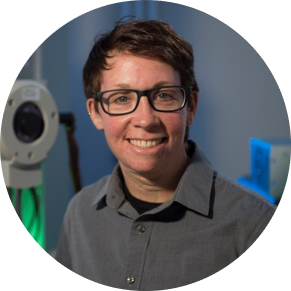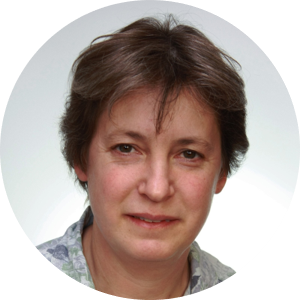
Molecules Webinar | Imaging Chemical Dynamics by Liquid Cell (Scanning) Transmission Electron Microscopy
Part of the MDPI Molecules Webinar series
3 May 2021, 00:00
molecules, Liquids, Organic materials, Inorganic Materials, Novel Energy Systems, Biological Specimens, Electrochemistry
Webinar Information
6th Molecules Webinar
Imaging Chemical Dynamics by Liquid Cell (Scanning) Transmission Electron Microscopy
Liquid Phase Electron Microscopy (LPEM) is a rapidly developing research field that is revolutionizing our fundamental scientific understanding of dynamic processes in liquids across the physical and life sciences, engineering and medicine. This webinar will bring together international leaders in LPEM from across these disciplines, who will provide personal perspectives on the current state-of-the-art and key immediate challenges to be addressed to continue to advance the methodology and its applications. These perspectives will include discussions on the usage and development of this new in situ/operando technology for studies involving the structure and dynamics of organic and inorganic materials, novel energy systems and biological specimens. Key topics will include experimental strategies, innovations in holder designs, beam sample interactions and the use of low dose LPEM, the nucleation and growth of nanoparticles and crystals, electrochemistry, the self-assembly and structure of soft matter, imaging biological samples to study cell and protein function, and advanced image acquisition, analysis and data interpretation.
This webinar intends to provide only a brief introduction to experimental and theoretical approaches to LPEM. The related Special Issue "Imaging Chemical Dynamics by Liquid Cell (Scanning) Transmission Electron Microscopy", which will be published by the open access journal Molecules, is open for submission, and contributions are encouraged.
We would also like to take this opportunity to draw attention to the 2022 Gordon research Conference in Liquid Phase Electron Microscopy, that will be held at the Four Points Sheraton/Holiday Inn Express, in Ventura, California, from January 29th to February 4th, 2022. Details on the conference topics and registration can be found here.
Prof. Dr. Nigel Browning
Pacific Northwest National Laboratory,
School of Engineering & School of Physical Sciences,
University of Liverpool,
Liverpool, UK
Date: 3 May 2021
Time: 5:00pm CEST
Webinar ID: 819 0225 2005
Webinar Secretariat: molecules.webinar@mdpi.com
Chair: Prof. Dr. Nigel Browning
The following experts will present and talk:
|
Prof. Dr. Nigel Browning, University of Liverpool, UK |
Professor Nigel Browning is currently the Chair of the Electron Microscopy in the School of Engineering and the School of Physical Sciences and Director of the Albert Crewe Centre for Electron Microscopy at the University of Liverpool (since 2017). He received his undergraduate degree in Physics from the University of Reading in the UK (1988), and his PhD in Physics from the University of Cambridge, UK (1991). He has held positions at Oak Ridge National Laboratory (1992–1995), Lawrence Berkeley National Laboratory (2003–2006), Lawrence Livermore National Laboratory (2006–2011), and most recently, was a Laboratory Fellow and Initiative Lead for the Chemical Imaging Initiative (CII) at the Pacific Northwest National Laboratory (PNNL) (2011–2017). He was also Assistant/Associate Professor of Physics at the University of Illinois in Chicago (1996–2002) and Professor of Materials Science (2003–2011) and Professor of Molecular Biology (2009–2011) at the University of California–Davis. He has over 30 years of experience in the development of new methods in electron microscopy for the high spatial, temporal and spectroscopic resolution analysis of engineering and biological structures. He is a Fellow of the American Association for the Advancement of Science (AAAS) and the Microscopy Society of America (MSA). He received the Burton Award from the Microscopy Society of America in 2002 and the Coble Award from the American Ceramic Society in 2003, for the development of atomic resolution methods in scanning transmission electron microscopy (STEM). With his collaborators at LLNL, he also received R&D 100 and Nano 50 Awards in 2008, and a Microscopy Today Innovation Award in 2010 for the development of the dynamic transmission electron microscope (DTEM). He has over 400 publications (~27,000 citations, h-index=88) and has given over 300 invited presentations on the development and application of advanced TEM methods. During his career, he has been the primary research advisor for over 60 PhD students and Postdoctoral Research Associates, many of whom now lead their own research programs at institutions around the world. In addition to his academic research, he is a co-founder and Vice-President for Strategy at a start-up company (Nuxutra), which is commercializing IP that he co-developed during his time at PNNL (10 patents in compressive sensing, super-resolution and machine learning imaging technologies). |
|
Prof. Dr. Niels de Jonge, INM - Leibniz Institute for New Materials, Germany |
Prof. Dr. Dr. h.c. Niels de Jonge received his MSc in Physics from the University of Amsterdam, Netherlands (1994), and a PhD in Natural Sciences, specializing in Biophysics, from the University of Freiburg, Germany (1999). He worked as a senior scientist at Philips Electronics, Research Department, Netherlands, on carbon nanotube electron sources (2000–2005). He was strategically hired at Oak Ridge National Laboratory, USA (ORNL), where he pioneered scanning the transmission electron microscopy (STEM) of liquid specimens (2005–2010). He joined Vanderbilt University School of Medicine, Nashville, USA, as an Assistant Professor of Biophysics (2007–2011). He is currently senior group leader at the INM—Leibniz Institute for New Materials, Germany (2012–present), and Honorary Professor of Experimental Physics, Saarland University, Germany. His main research area is the liquid phase electron microscopy of biological samples, for example, to study membrane proteins in cancer cells. He received the ORNL innovation award, the ORNL Esprit de Corps award, the 2016 MRS Innovations in Materials Characterization Award, the 2016 European Microscopy Award life sciences category, and obtained an Honoris Causa at the University of Lyon, France (2017). He was Chair of the first Gordon Research Conference on Liquid Phase Electron Microscopy, Tuscany, Italy (2020). He published a total of 265 papers and book chapters, of which 174 were in peer-reviewed journals. His h-index = 36 (Web of Science) or 45 (Google Scholar). |
|
Prof. Dr. Nathan C. Gianneschi, Northwestern University, IL, United States |
Prof. Dr. Nathan C. Gianneschi received his BSc (Hons) at the University of Adelaide, Australia in 1999. In 2005, he completed his PhD at Northwestern University. Following a Dow Chemical postdoctoral fellowship at The Scripps Research Institute, in 2008, he began his independent career at the University of California, San Diego, where, until June 2017, he was Teddy Traylor Scholar and Professor of Chemistry and Biochemistry, NanoEngineering and Materials Science and Engineering. In July 2017, Gianneschi moved his research group to Northwestern University, where he is currently Jacob and Rosaline Cohn Professor of Chemistry, Materials Science and Engineering, and Biomedical Engineering. The Gianneschi group takes an interdisciplinary approach to nanomaterials research with a focus on multifunctional materials, with interests that include biomedical applications, programmed interactions with biomolecules and cells, and basic research into nanoscale materials design, synthesis and characterization. For this work, he has been awarded the NIH Director's New Innovator Award, the NIH Director's Transformative Research Award and the White House's highest honor for young scientists and engineers, with a Presidential Early Career Award for Scientists and Engineers. Prof. Gianneschi was awarded a Dreyfus Foundation Fellowship, is a Kavli Fellow of the National Academy of Sciences, a Fellow of the Royal Society of Chemistry, and is an Alfred P. Sloan Foundation Fellow. |
|
Prof. Dr. Deb Kelly, Pennsylvania State University, PA, United States |
Prof. Dr. Deb Kelly completed her PhD in Molecular Biophysics at Florida State University and her post-doctoral training in Structural Biology at Harvard Medical School. During these pursuits, she developed technical breakthroughs in the field of cryo-EM that are now being used by the liquid-phase EM community. As interest in liquid-phase imaging has skyrocketed in recent years, the Kelly team has been leading the adaptation of this technology for biomedical applications, in particular virus research. Dr. Kelly is currently a professor of Biomedical Engineering at Pennsylvania State University, where she holds the Lloyd and Dottie Foehr Huck Chair in Molecular Biophysics and directs the Center for Structural Oncology (CSO). The CSO aims to combat the molecular culprits that fuel human disease by revealing their hidden vulnerabilities. |
|
Prof. Dr. Frances Ross, Massachusetts Institute of Technology (MIT), MA, United States |
Prof. Dr. Frances M. Ross works at the Massachusetts Institute of Technology Department of Materials Science and Engineering. She received her BA in Physics and PhD in Materials Science from Cambridge University, UK, and has worked at A.T.&T. Bell Laboratories, the National Center for Electron Microscopy, Lawrence Berkeley National Laboratory, and the IBM T. J. Watson Research Center. At IBM, she imaged the growth of nanoscale materials, using a microscope with deposition and focused ion beam capabilities, developed liquid cell microscopy for visualizing electrochemical processes, and measured growth and transport properties in a combined focused ion beam-scanning tunneling microscope. At MIT, her research continues to center on nanostructure self-assembly, liquid cell microscopy, epitaxy and electrochemical processes. |
Program
|
Speaker/Presentation |
Time in CEST |
|
Prof. Dr. Nigel Browning Chair Introduction |
5:00 – 5:05 pm |
|
Prof. Dr. Nigel Browning Sampling Strategies for Low-Dose Imaging in Liquids |
5:05 – 5:25 pm |
|
Prof. Dr. Niels de Jonge Prospects and Challenges of Dynamic Liquid Phase Electron Microscopy |
5:25 – 5:45 pm |
|
Prof. Dr. Nathan C. Gianneschi The Four Imaging Modes of Liquid Phase TEM: A Focus on Challenges and Opportunities for Soft Materials |
5:45 – 6:05 pm |
|
Prof. Dr. Deb Kelly Revealing the Inner-Workings of Viruses and Vaccines using High-Resolution Imaging |
6:05 – 6:25 pm |
|
Prof. Dr. Frances Ross Enhancing Liquid Cell Capabilities for Electrochemistry |
6:25 – 6:45 pm |
| Q&A Session |
6:45 – 6:10 pm |
|
Closing of Webinar |
6:10 – 6:15 pm |
Webinar Content
On Monday 3 May 2021, MDPI and the Journal Molecules organized the 6th webinar entitled "Imaging Chemical Dynamics by Liquid Cell (Scanning) Transmission Electron Microscopy".
The introduction was held by the Chair of the webinar, Prof. Dr. Nigel Browning, from the University of Liverpool, UK. Professor Browning also held the first presentation and talked about the different sampling strategies for low-dose imagining in liquids.
The third presentation was given by Prof. Dr. Nathan C. Gianneschi from Northwestern University, USA. He discussed the four imaging modes of liquid phase TEM, whilst focusing in particular on the challenges and opportunites for soft materials. The Gianneschi group takes an interdisciplinary approach to nanomaterials research with a focus on multifunctional materials, with interests that include biomedical applications, programmed interactions with biomolecules and cells, and basic research into nanoscale materials design, synthesis and characterization.
Prof. Dr. Deb Kelly from Pennsylvania State University, USA, followed by revealing the inner-workings of viruses and vaccines using high-resolution imaging. As interest in liquid-phase imaging has skyrocketed in recent years, the Kelly team has been leading the adaptation of this technology for biomedical applications, in particular virus research.
The fifth and final presentation was given by Prof. Dr. Frances Ross from Massachusetts Institute of Technology (MIT), USA. Her talk covered the topic of enhancing the liquid cell capabilities for electrochemistry, seeing as her research at MIT is centred on nanostructure self-assembly, liquid cell microscopy, epitaxy and electrochemical processes
The presentations were followed by a Q&A and a discussion, moderated by the Chair. The webinar was offered via Zoom and required registration to attend. The full recording can be found here on Sciforum website. In order to stay updated on the next webinars on Molecules, be sure to sign up for our newsletter by clicking on “Subscribe” at the top of the page.
Relevant Special Issues
Imaging Chemical Dynamics by Liquid Cell (Scanning) Transmission Electron Microscopy
Guest Editors: Prof. Dr. Nigel D. Browning, Dr. B. Layla Mehdi
Deadline for manuscript submissions: 15 August 2021











